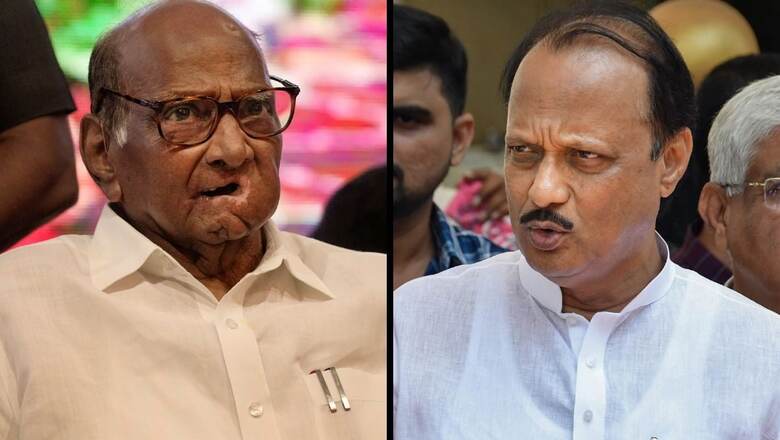
views
The recent turmoil within the Nationalist Congress Party (NCP), triggered by the unexpected departure of Ajit Pawar, nephew of party patriarch Sharad Pawar, to align with the BJP-Shiv Sena government, serves as a stark reminder of the inherent consequences and destiny that often accompany dynastic politics. In the context of politics, the Nehruvian notion of familial legacy has long been touted as a source of stability and expertise. However, it is imperative that we carefully navigate the delicate equilibrium between perpetuating lineage and upholding meritocracy.
The ongoing crisis within Maharashtra’s NCP has sparked a pressing need to delve into the ramifications of dynastic politics on India’s democratic framework. This calls for a thorough analysis of the significance of fostering fresh leadership, inclusivity, and fortifying internal party democracy.
In the contemporary political landscape, the ascent of the Bharatiya Janata Party (BJP) has sparked a prevailing sentiment among the masses that the perpetuation of dynastic politics is an untenable proposition. A common trend in Indian politics has been the development of a particular brand of politics, one that the Congress party has nurtured. This brand, characterised by the perpetuation of dynastic rule, has found its way into the fabric of numerous regional political parties across the nation.
Ramifications of Dynastic Politics
Indeed, it is not uncommon to witness the prevalence of dynastic politics in the majority of these regional entities. In contemplating the future trajectory of India, one cannot help but question the efficacy of its current political system. The recent NCP crisis in Maharashtra serves as a poignant reminder that dynasties, despite their claims of unwavering loyalty towards their family and steadfast adherence to a particular ideology, often fall short of these lofty ideals.
Throughout the annals of history, from the era of ancient rulers to the present-day reign of dynasties, one cannot help but notice the enduring nature of certain narratives. Tales of revenge, the absence of loyalty, and the insatiable thirst for power persist, transcending time and societal shifts. These age-old motifs, woven into the fabric of human existence, continue to captivate and resonate with audiences across generations. It is a testament to the unchanging aspects of human nature that these stories, despite their antiquity, remain as relevant and compelling as ever.
BJP’s Different Approach
One cannot overlook the crucial factor contributing to the triumph of the BJP — its distinct lack of a dynastic structure. While one may engage in debates and express disagreements with the ideology of the BJP, it is undeniable that this political entity has embraced a policy of inclusivity, providing opportunities for all its dedicated members, commonly known as karyakartas, to actively participate in its activities. In a political landscape often dominated by dynastic parties, the BJP has taken a different approach, one that has allowed grassroots leaders to flourish and pave the way for their success.
This unique strategy stands in stark contrast to the practices of other political entities, which have traditionally stifled the growth of emerging leaders outside their established family hierarchies. By granting autonomy and freedom to grassroots leaders, the BJP has created an environment conducive to their organic development. This approach acknowledges the potential and talent that exist beyond the confines of established political dynasties. It recognises that leadership qualities can emerge from unexpected sources and that nurturing these individuals can bring fresh perspectives and innovative ideas to the forefront. In contrast, dynastic parties have long been criticised for their tendency to prioritise familial ties over meritocracy.
Undermining meritocracy
The time has come to acknowledge that senior NCP leader and current Maharashtra Deputy Chief Minister Ajit Pawar’s discontent with party progenitor Sharad Pawar is natural. Sharad Pawar has never permitted Ajit to become chief minister, despite the fact that he had the credentials and the party had the necessary number of members. The answer to the query of why Sharad Pawar did this is that he wanted to keep power within his immediate family, which includes his daughter.
This demonstrates how dynastic politics undermines meritocracy, in which political leadership should be based on talent, capabilities, and accomplishments. In a system dominated by political families, qualified and deserving individuals are frequently passed over in favour of familial ties. This deprives the nation of innovative ideas, fresh perspectives, and capable leaders who can effectively address the challenges of a diverse and dynamic society. By perpetuating dynastic politics, India fails to maximise its potential and stifles the development of new leaders who can significantly contribute to the nation’s advancement.
Need for Change
The recent crisis within the Nationalist Congress Party has significant consequences for Maharashtra’s politics and Indian democracy as a whole. Firstly, the crisis erodes public trust in political parties and institutions. When a party that has been in power for decades is torn apart by infighting, it sends a message to voters that the political process is rigged and that their voices do not matter. This can lead to disillusionment and a decline in democratic participation.
Secondly, the crisis highlights the urgent need for political parties to democratise their internal structures and processes. Parties must prioritise talent, merit, and inclusivity over familial ties if they want to be seen as legitimate by the public. Internal democracy, where party members have a say in decision-making and leadership selection, is essential for the growth and sustainability of political parties.
Thirdly, the crisis presents an opportunity for political reform. It prompts a reevaluation of electoral systems and party funding mechanisms to reduce the influence of money and dynastic politics. Measures such as stricter regulations on campaign finance, transparency in party funding, and the promotion of inner-party democracy could help curb the negative impacts of dynastic politics.
The NCP crisis is a wake-up call for Indian democracy. It shows that the current system is not working and that reforms are needed to make our democracy more responsive, inclusive, and accountable.
The Congress party has the greatest stake in the dynastic politics that has ravaged the Indian political system. In every state, from Gandhis to Muftis, Abdullahs, Yadavs, Karunanidhis, Badals, Gowdas, and Banerjees, there are political dynasties, and the populace is aware of their negative effects. There is also an increase in non-dynastic political parties, such as the Aam Aadmi Party (AAP). It is time for India to consider alternatives to these dynasties, as they have little to offer. If the status quo is maintained, more NCP and Shiv Sena-like divisions will occur because dynastic oppression cannot continue. It is time for new ideas, new personalities, and new political structures.
The author is a visiting professor of journalism, a political columnist, and a doctoral research scholar. He tweets at @sayantan_gh. Views are personal, and do not represent the position of this publication.


















Comments
0 comment